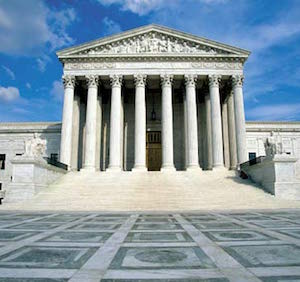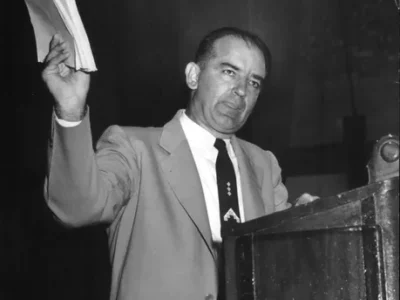What Does Justice Kennedy’s Retirement Mean for Environmental Protection?
Short Answer: It’s Not Good
 The news that Justice Anthony Kennedy is retiring has ramifications for many important areas in constitutional law, including affirmative action, same-sex marriage, and abortion. His vote was also pivotal in many environmental cases. Justice Kennedy will almost certainly be replaced by a more conservative justice. If that justice votes with the conservative wing of the Court on environmental cases (and it’s hard to imagine Trump appointing someone other than a hard core conservative), environmental causes are almost certain to suffer.
The news that Justice Anthony Kennedy is retiring has ramifications for many important areas in constitutional law, including affirmative action, same-sex marriage, and abortion. His vote was also pivotal in many environmental cases. Justice Kennedy will almost certainly be replaced by a more conservative justice. If that justice votes with the conservative wing of the Court on environmental cases (and it’s hard to imagine Trump appointing someone other than a hard core conservative), environmental causes are almost certain to suffer.
Justice Kennedy provided pivotal votes in several cases that were environmentally protective. Most importantly, he was the crucial fifth vote in Massachusetts v. EPA, the landmark climate change case. In Mass v. EPA, the Court held 1) that states had standing to sue the federal government for failure to regulate greenhouse gases and 2) that greenhouse gases are pollutants under the Clean Air Act and EPA has a statuory duty to determine whether and how to regulate them. The justices in the majority in Mass v. EPA also embraced the science of climate change.
A more conservative court could overturn Mass v. EPA or, perhaps more likely, significantly curtail its reach. Justice Scalia had already begun to lay the ground work for curtailing EPA’s power to regulate greenhouse gases in a subsequent case, Utility Air Regulatory Group v. EPA. Even though the Court largely upheld greenhouse gas emissions regulations for so-called “new sources” of greenhouse gases, the UARG Court also held that EPA had overreached its authority in regulating smaller sources that had not previously been regulated. With a new Justice on the Court who opposes Mass v EPA, it isn’t hard to imagine the Court imposing significant limitations on EPA’s ability to regulate greenhouse gases. If a Democrat were elected President in 2020 and attempted to reinstate something like the Clean Power Plan, for example, we could well see the Supreme Court strike such a rule down. Even more alarming, it’s worth noting that in the UARG case, two current Justices, Alito and Thomas, would have overturned Mass v EPA. Add Justice Gorsuch and the new Justice, persuade Justice Roberts to join in, and Mass v EPA is overturned.
A more conservative Court could also significantly curtail the right of environmental plaintiffs to sue the federal government for failing to exercise its responsibility to protect the environment under various federal statutes. Mass v EPA provides a good example. A huge issue in the case was whether Massachusetts and other plaintiffs had “standing” to bring the lawsuit. The five Justices in the majority, including Justice Kennedy, held that Massachusetts did, indeed, have standing and that in the context of greenhouse gas regulation, courts should grant “special solicitude” to states in determining whether they could sue. With a more conservative Justice on the Court, states could easily lose that special solicitude and be unable to get into Court to challenge federal government action that undermines environmental protection, especially in the context of climate change. And environmental non-profit groups seeking to sue the federal government could easily see a revival of cases like those in the 1990s, including Luján v. Defenders of Wildlife, that restricted their standing to bring cases.
Justice Kennedy was also the crucial vote in a major case involving the protection of wetlands, Rapanos v. United States. The question in the Rapanos case involves how far the jurisdiction of the Environmental Protection Agency and the Army Corps of Engineers extends to protect wetlands under the Clean Water Act. As I explained in a previous post:
[in Rapanos] the justices split three different ways in trying to decide which wetlands the Clean Water Act covers. The four conservatives then on the Court would have restricted jurisdiction significantly [as described in Justice Scalia’s plurality opinion.] The four liberals would have upheld expansive jurisdiction. Justice Kennedy authored his own opinion which included a more expansive definition of jurisdiction than the four conservatives. When you add Justice Kennedy’s vote to the four liberals on the Court, you get a majority that would uphold Clean Water Act jurisdiction as long as, in Justice Kennedy’s words, the government can show that wetlands have a ‘significant nexus’ to waters “that are or were navigable in fact or that could reasonably be so made.”
Justice Kennedy’s opinion then became the basis for the Obama Administration’s Waters of the United States Rule setting forth how it would regulate wetlands. The Trump Administration has announced it is repealing the so-called “WOTUS” rule and is looking to replace it with a rule that essentially codifies Justice Scalia’s very narrow view of wetlands jurisdiction. If Justice Kennedy remained on the Court, the Trump Administration’s efforts would likely fail. With a new, more conservative justice, we are likely not only to see a Trump rule upheld but also the invalidation of any attempt by a new, more environmentally friendly administration to assert more expansive jurisdiction over the protection of wetlands.
Finally, we may well see a resurgence of Court opinions finding in favor of private property owners in cases brought under the Takings Clause of the U.S. Constitution. At least two areas of concern are worth noting. First, Justice Kennedy provided the fifth vote in the infamous Kelo v. City of New London, in which the Court upheld the City’s right to exercise its power of eminent domain by taking a parcel of property from one private property owner and transferring it to another in the name of economic development. We could easily see a new Kelo-like challenge with a more conservative Justice, and an opinion that limits the governmental power to excercise eminent domain. Second, it isn’t hard to imagine a more conservative Court being willing to curtail the regulation of private property for uses like habitat for endangered species and for wetlands protection.
Reader Comments
8 Replies to “What Does Justice Kennedy’s Retirement Mean for Environmental Protection?”
Comments are closed.







Dan, what a tragedy, if only academics could learn how to inform, educate and motivate the public maybe we could keep politicians and the power of money from destroying our democracy, civilization and planet.
Thanks – we’re trying. But the post was written by Ann, not Dan.
Thank you Ann, please believe me when I say I greatly respect your expertise.
I usually address my comments to Dan since he is my Berkeley representative that I usually communicate with, and I consider Legal Planet posts to be conversations among all people who are as concerned as you are about our failures to protect our newest generations from disasters we are creating. I have two granddaughters who motivate me constantly to do my best to make the right things happen even though academics typically marginalize We The People to discourage us from from participating in your blogs, and that is the cultural failure I never stop trying to overcome.
Please motivate all your colleagues to try much, much harder to join together to inform, educate and motivate the public to save our democracy, civilization and planet because your post makes it perfectly clear we are not communicating with each other to stop the power of money from destroying everything.
For what it is worth, I firmly believe that the superior prefrontal cortex that females have give us our best chance to overcome the destructive amygdala dominated males.
With respect, Anthony St. John UCB ’63
Ann, one important thought that always requires serious consideration was produced by Richard Hofstadter in 1963 when he concluded “— so many intellectuals don’t want to take on the sort of complications and impurities that come with being public.”
I submit this conclusion to Legal Planet scholars for serious consideration because it might be your Achilles heel that prevents you from achieving your paramount goals for “translating the latest developments in a way that’s understandable to a mass audience” to meet the “global challenge of climate change.”
I wish you the best in achieving your goals so we can adapt in time:
https://alumni.berkeley.edu/california-magazine/september-october-2006-global-warning/can-we-adapt-time
Ann, a reference for your most serious consideration and support:
Chancellor’s Letter: Planning for Change By Carol T. Christ
https://alumni.berkeley.edu/california-magazine/spring-2018-edibles-and-potables/chancellors-letter-planning-change
REPORT: Trump Privately Predicts He Will Appoint 4 Supreme Court Justices:
“……The President reportedly said he thinks he will appoint four Justices by the end of his first term. Ginsburg, 85 and very frail is expected to retire from the bench soon which Trump noted; he also savaged Sotomayor for her health problems. The President privately pointed out Sotomayor’s serious battle with diabetes as a reason why she may be leaving the bench soon…….”
https://www.thegatewaypundit.com/2018/06/report-potus-trump-privately-predicts-he-will-appoint-4-supreme-court-justices-zings-sotomayor/
Ann said;
“……..The news that Justice Anthony Kennedy is retiring has ramifications for many important areas in constitutional law, including affirmative action, same-sex marriage, and abortion….”
Dear Ann,
As you correctly point out, same-sex marriage is a high priority target because this ugly travesty was forcefully imposed on America. We repudiate this public depravity and abhor its dreadful effects on children. Be prepared to say goodbye to same-sex marriage.
What effects on children? Do you have any studies to back up your statements or is this just far-right fearmongering?